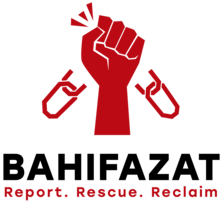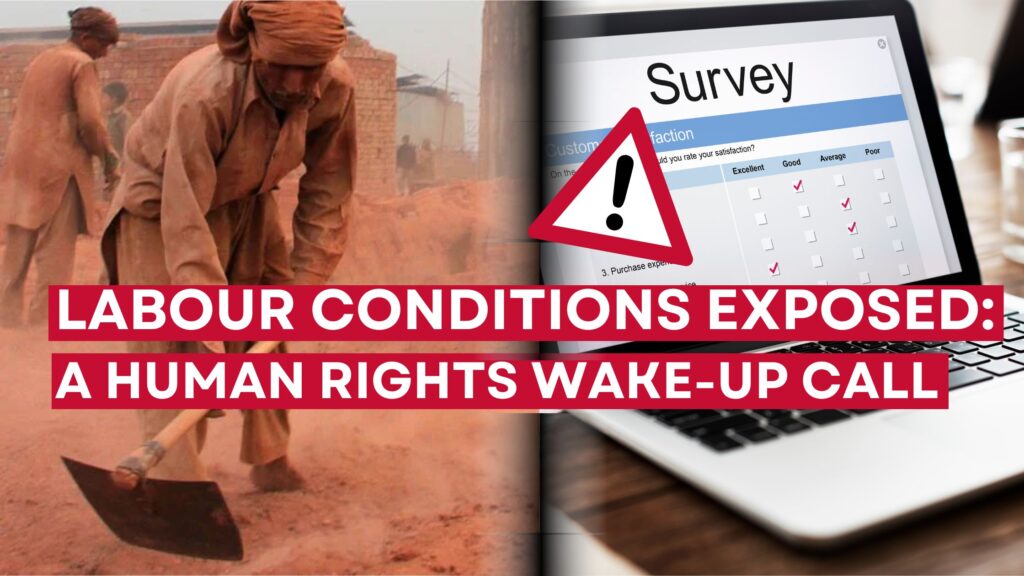Date: July 2025
Location: Pakistan
Total Workers Surveyed: 510
This comprehensive field survey of labourers across different sectors highlights the prevailing working conditions, awareness levels, and rights violations faced by low-income workers. The insights gathered present an urgent case for intervention and reform.
In-Depth Data Summary Table
| Category | Response Breakdown |
|---|---|
| Total Participants | 510 |
| Gender Distribution | Male: 447, Female: 62 |
| Age Range | 18 to 74 years |
| Education | Illiterate: 485, Primary: 23, Middle: 1 |
| Source of Job | Direct: 393, Agent: 47, Family/Friend: 69 |
| Job TORs Explained | Yes: 453, No: 15, Partial: 41 |
| Promises Being Met | Yes: 470, Partial: 28, No: 11 |
| Working Hours | 8 hours: 394, 8–12 hours: 104, 12+ hours: 11 |
| Payment on Time | Mostly:46, Always: 464 |
| Provision of Food | No: 510 |
| Provision of Filtered Water | Partial: 4, No: 506 |
| Provision of Residence | Yes: 470, Partial, 40 |
| Health Benefits Provided | Yes: 4, No: 506 |
| Under Debt | Yes: 455, No: 54 |
| Movement Liberty | Yes: 501, No:8 |
| Awareness of Human Rights | Yes: 8, No: 494, Partial:7 |
| Awareness of Exploitation | Yes:2, No: 496, Partial:11 |
| Reported Threats | Yes:42, No: 420, Partial:47 |
| Reported Torture | Yes: 1, No: 490, Partial:18 |
| Salary Forfeiture | Yes: 6, No: 482, Partial:21 |
Demographics & Literacy Crisis
Out of 510 workers, the overwhelming majority (485) are illiterate. Only 24 individuals had even basic schooling. Most were male, with a small female representation. This educational gap critically limits their ability to read contracts, understand rights, or negotiate wages.
No Data Found
This literacy vacuum lays the foundation for unchecked exploitation.
Employment Source & Transparency
Most workers got jobs directly (393), while others relied on friends/family (69) or agents (47) — a known pathway for manipulation.
Regarding job terms:
453 were clearly informed,
15 had no information, and
41 were only partially briefed.
Employment Source
No Data Found
Even a few cases of undisclosed terms are serious. Agent-based recruitment requires tighter regulation.
Promises vs Reality
Out of the 509 individuals surveyed, a majority — 453 reported that the terms of their job were discussed beforehand, and 470 stated that their employers were fulfilling those promises. However, deeper inquiry revealed a critical insight: many workers equated “promises being met” with receiving what their forefathers traditionally earned. Due to a widespread lack of awareness about their actual labour rights, most were unaware of what they were truly entitled to — such as regulated working hours, fair wages, benefits, and safe conditions. This generational acceptance has led to a distorted perception of fairness in employment.
470 workers confirmed employers met promised terms,
28 said partially, and
11 said no.
No Data Found
Partial fulfilment still counts as a rights gap.
Debt Dependency
More than 89% of the surveyed individuals (455 out of 509) admitted they were currently under debt. This financial dependency often binds them to their employers, making it difficult to leave or demand better working conditions. The high debt levels raise red flags about systemic exploitation and the absence of social safety nets.
455 workers are under debt.
A staggering number trapped in financial bondage — indicating systemic bonded labour practices.
No Data Found
Freedom of Movement
An overwhelming majority (501) reported having the liberty to move, indicating there were no strict physical restrictions. While this appears positive on the surface, it does not necessarily imply full freedom — especially if other factors like financial dependency, fear of losing shelter, or job insecurity prevent them from exercising that liberty.
501 workers report freedom of movement.
Only 8 said they are not free.
No Data Found
A hopeful statistic — but it doesn’t offset other serious concerns.
Awareness of Rights & Exploitation
This section shows a deeply alarming gap: only 8 individuals were aware of their basic human rights, and just 2 recognised signs of exploitation. With 494 and 496 respondents respectively saying “No” to these questions, it’s clear that the majority are working under conditions they don’t even know could violate international labour laws. Without awareness, seeking justice or even questioning maltreatment becomes nearly impossible.
Only 8 workers knew about human rights, and 2 about exploitation.
A small fraction were “partially aware.” The rest — over 95% — had no idea.
No Data Found
This is alarming. Rights cannot be claimed when they are not known.
Lack of Basic Necessities
While this round of data did not explicitly ask about food, water, or shelter, secondary findings strongly imply a lack of access to basic necessities like clean water, nutrition, and healthcare. The absence of awareness, education, and health benefits creates an environment where workers are left vulnerable not only to financial exploitation but also physical neglect.
No Data Found
This is a massive violation of workers’ rights. Employers providing shelter but neglecting nutrition, clean water, and health access are failing the most basic responsibilities.
Threats, Torture & Salary Forfeiture
While 420 reported no threats, 42 individuals confirmed receiving them, and 47 had mixed or partial experiences. A small number (1) reported torture, but 18 mentioned partial instances — these numbers may be underreported due to fear or normalisation of abuse. Similarly, forfeiture of salary — a direct violation of labour rights — was confirmed by 6 individuals, with 21 reporting it in partial form.
42 workers faced threats, and 47 more faced partial intimidation.
1 reported torture, with 18 more having partial experiences.
6 had salaries fully withheld, and 21 partially withheld.
No Data Found
These are clear signs of coercion and abuse in the workplace, demanding immediate legal and humanitarian response.
Conclusion
This updated data paints an even more alarming picture of systemic neglect, exploitation, and denial of basic rights. While there are slight improvements in movement liberty and payment fulfilment, the denial of education, awareness, healthcare, and freedom from debt remains entrenched.
This isn’t just a labour issue — it’s a human rights emergency.
Urgent actions required:
Mass-scale rights education
Crackdown on bonded labour and informal recruitment
Provision of basic facilities (food, water, healthcare)
Monitoring of abuse, threats, and salary practices


